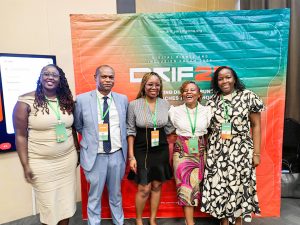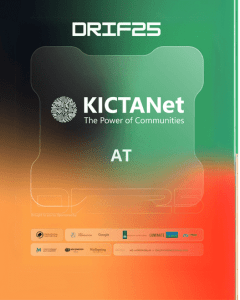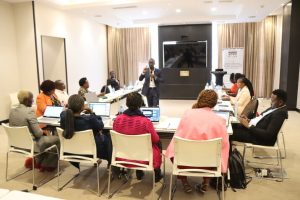By Dr. George Musumba
The AI Statement of Principles and Africa AI Convening, held in Nairobi from January 28-29, 2025, marked a significant milestone in Kenya’s pursuit of AI leadership.
Bringing together over 120 participants from government, academia, the private sector, civil society, and international partners, the event laid the groundwork for strengthening Kenya’s AI governance and addressing critical challenges.
Day 1: The AI Statement of Principles Workshop
The first day focused on introducing and refining Kenya’s AI Statement of Principles, a critical framework designed to ensure that AI technologies in Kenya are safe, ethical, inclusive, and trustworthy.
This document is essential as it aligns AI developments with global standards while addressing the country’s unique socio-economic challenges. The AI Statement of Principles framework is foundational for guiding AI adoption across Kenya, ensuring that AI’s potential is harnessed responsibly.
In the opening remarks, Ali Hussein, Chairperson Board of Trustees KICTANet, emphasized the importance of developing an AI framework tailored to Kenya’s socio-economic realities.
Hussein highlighted that Kenya’s approach to AI governance must align with its values of fairness, transparency, and inclusivity. He also underscored the necessity of addressing the specific challenges faced by marginalized communities, ensuring AI systems benefit all segments of society.
Mary N. Kerema, the Secretary of ICT and E-Government, outlined Kenya’s vision to become a regional leader in AI. She stressed the importance of homegrown AI solutions that are adapted to Kenya’s national development priorities. Kerema called for inclusive AI adoption and ethical considerations such as data privacy, accountability, and bias reduction in the development of AI systems.
Ambassador Philip Thigo, MBS, the Special Envoy of Technology, delivered the keynote address, which reinforced the need for Kenya to build AI governance frameworks that are safe, secure, inclusive, and adaptable to technological advancements. Thigo emphasized the importance of AI models that reflect Kenya’s diverse cultural and linguistic landscape, ensuring AI systems are relevant to local contexts.
Panel Discussions on Key AI Principles
A major part of Day 1 consisted of panel discussions on the four pillars of the AI Statement of Principles: safety, security, inclusivity, and trustworthiness. Panelists discussed the risks associated with AI, such as algorithmic biases, data misuse, and the displacement of jobs.
These discussions highlighted the need for robust AI governance that ensures AI systems are deployed safely and ethically across all sectors.
The inclusivity panel explored how AI must be designed to benefit marginalized groups, such as women, youth, persons with disabilities, and rural populations. The focus was on creating equitable access to AI technologies, ensuring that no one is left behind as AI technologies are implemented.
The trustworthiness panel emphasized the necessity of ensuring transparency and accountability in AI decision-making, particularly in public service applications like social protection programs and criminal justice.
Breakout Sessions and Deep Dive Discussions
After the panel discussions, participants broke into breakout sessions to dive deeper into AI governance, innovation, and safety. These sessions allowed for targeted discussions on data governance, AI innovation opportunities, AI workforce development, and AI safety.
Participants emphasized the importance of collaborative partnerships between government, private sector, academia, and civil society to foster AI research, development, and adoption in Kenya.
AI safety was a key topic in the breakout sessions, particularly addressing AI biases and data security. Participants noted that AI technologies must be transparent and understandable, with adequate measures in place to mitigate biases in decision-making.
Additionally, AI regulations must evolve to keep pace with the rapidly changing technology landscape, ensuring AI is used responsibly while fostering innovation.
AI Use Cases and Innovation Showcases
The workshop also featured AI use cases from KICTANet, ACTS, and Action Lab. These presentations highlighted various AI-driven solutions in sectors like agriculture, healthcare, and public services.
The showcase emphasized the importance of creating a robust AI ecosystem in Kenya, with a focus on data governance, institutional support, and local AI innovations.
Bilateral Meetings: Strengthening UK-Kenya AI Partnerships
In addition to the plenary sessions, bilateral meetings took place between representatives from the UK and Kenya. These meetings explored collaborative opportunities for AI innovation, knowledge exchange, and capacity building.
Discussions focused on sharing best practices in AI governance, data privacy, and AI research. These discussions also emphasized the importance of creating partnerships between the public sector, private sector, and academia to strengthen Kenya’s AI ecosystem.
Day 2: Kenya’s Role in Africa’s AI Future
Day 2 of the event focused on Kenya’s role in shaping Africa’s AI future. Discussions centred on Kenya’s leadership in AI governance and its growing position as an AI innovator on the African continent.
Participants explored AI policy priorities, international collaboration, and strategies for building Kenya’s AI ecosystem.
Global Partnerships and Collaborative Efforts
A key theme of Day 2 was collaboration between Kenya and global AI stakeholders.
The UK-Kenya AI Partnership was highlighted as a critical collaboration aimed at implementing Kenya’s AI strategy, with a focus on ethical data handling and tackling global challenges such as climate change, healthcare, and food security.
This partnership will leverage the AI Challenge Fund to support projects that address pressing socio-economic needs, while also enhancing Kenya’s AI infrastructure and talent development.
Similarly, Kenya’s collaboration with France in the AI Action Summit was discussed, with the University of Nairobi’s waste management project set to be showcased at the summit in Paris.
This initiative exemplifies how Kenya’s AI-driven projects can contribute to global AI standards and best practices.
AI Governance, Security, and Trust
Participants emphasized the importance of AI security and trust in public applications. Given the rapid adoption of AI technologies, ensuring their safety in sectors such as healthcare, public administration, and criminal justice is crucial.
Discussions also touched on cybersecurity risks and the need to establish frameworks to address potential AI-driven threats like deepfakes and AI-generated disinformation.
Panellists called for transparency in AI decision-making processes and proposed mechanisms such as AI labelling and watermarking to help users identify AI-generated content.
These measures are essential to fostering public trust in AI systems, particularly when they are used in sensitive applications such as public policy, social welfare, and criminal justice.
Building the AI Workforce and Talent Development
Another key discussion point was skills development and AI talent building. Kenya faces a significant skills gap in AI, and there is a growing need to upskill the workforce to meet the demands of the digital economy.
Stakeholders discussed the importance of AI education, training programs, and collaborations between universities and industry to develop a talent pipeline for the AI sector.
Incentives for AI research and innovation were also discussed, as well as the need for initiatives that promote youth inclusion in the AI workforce.
Building a Robust AI Ecosystem for Kenya and Africa
The AI Statement of Principles workshop and the Africa AI Convening highlighted Kenya’s potential to become a regional leader in AI governance and innovation.
Through collaborative partnerships, inclusive AI solutions, and strategic investments, Kenya is well-positioned to build an AI ecosystem that fosters socio-economic growth, ethical development, and sustainable progress.
The discussions underscored the need for local AI solutions that address Kenya’s unique challenges while aligning with global standards and best practices.
Data sovereignty, inclusive innovation, and collaborative partnerships will be essential to ensuring that AI serves the public good, enhances national development, and contributes to Africa’s digital transformation.
As Kenya continues to refine its AI strategies and engage with international partners, it is clear that AI technologies will play a significant role in shaping the country’s future, contributing to economic growth, social equity, and technological advancement across the continent.
Kenya’s AI Strategy Moving Forward
As the two-day event concluded, it was clear that Kenya’s AI future is bright, but significant efforts are needed to address challenges in data governance, infrastructure, and skills development.
The conversations underscored the importance of localizing AI solutions to address Kenya’s specific needs and ensuring that AI technologies are used ethically and inclusively.
The AI Statement of Principles workshop and the Africa AI Convening served as crucial milestones for Kenya in its journey to becoming an AI leader.
By strengthening its AI governance, fostering collaborative partnerships, and investing in AI skills, Kenya is well-positioned to drive AI innovation that is both sustainable and inclusive.
The outcomes of the convening will inform the country’s approach to AI policy development, guiding its participation in global AI governance while ensuring that Kenya’s AI agenda is shaped by local contexts and needs.
As Kenya continues to build on its AI Statement of Principles, it will play a key role in shaping Africa’s digital future, contributing to global AI standards and innovations that drive economic growth and sustainable development across the continent.
READ
Dr. George Musumba, AI Consultant, KICTANET
![]()




